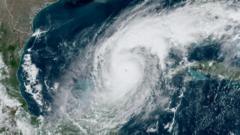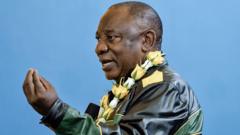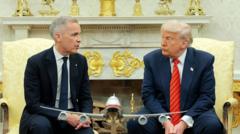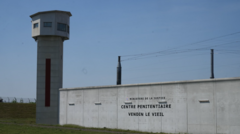In a significant interview, Taiwan's defense chief highlights the urgency of preparing for asymmetric warfare amid rising tensions with China, alongside confidence in U.S. deterrence power.
Taiwan's Defense Minister Emphasizes Importance of U.S. Support Against China

Taiwan's Defense Minister Emphasizes Importance of U.S. Support Against China
Wellington Koo discusses the necessity for Taiwan to bolster its defenses while recognizing U.S. role in regional security during uncertain times.
Taiwan's Defense Minister, Wellington Koo, has expressed confidence in the United States' ability to deter potential Chinese aggression against the island while also stressing the importance of Taiwan enhancing its own military readiness. Koo, in a detailed discussion with various media on his first anniversary as defense minister, acknowledged that the Trump administration's policies have sparked concerns among Taiwanese regarding U.S. support in the event of a Chinese attack, given China's claim over Taiwan as its territory.
His interview reveals a dual perspective: while affirming that U.S. military might and alliances can significantly curb China’s ambitions, Koo warned that Taiwan must also prepare for asymmetric warfare. "If China can be made to understand that the potential costs would be extremely, extremely high," Koo stated, "then that will make it extremely hard for it to make a decision" for war. This sentiment illustrates a proactive approach from Taiwan, focusing on deterrence strategies, which he believes aligns with U.S. interests in maintaining stability in the Indo-Pacific region.
Taiwan's increasing military expenditure is part of a broader strategy to prepare for potential threats. Koo mentioned that the Trump administration’s focus on "America first" does not exclude the notion of Indo-Pacific security being a priority. He underscored that cooperation between the U.S. and Taiwan is vital for regional peace, especially the stability of the Taiwan Strait.
The backdrop of heightened military activity and rhetoric from Beijing continues to influence Taiwan's defense strategy as it navigates its precarious position between reliance on American support and the necessity of self-reliance in military capabilities.
His interview reveals a dual perspective: while affirming that U.S. military might and alliances can significantly curb China’s ambitions, Koo warned that Taiwan must also prepare for asymmetric warfare. "If China can be made to understand that the potential costs would be extremely, extremely high," Koo stated, "then that will make it extremely hard for it to make a decision" for war. This sentiment illustrates a proactive approach from Taiwan, focusing on deterrence strategies, which he believes aligns with U.S. interests in maintaining stability in the Indo-Pacific region.
Taiwan's increasing military expenditure is part of a broader strategy to prepare for potential threats. Koo mentioned that the Trump administration’s focus on "America first" does not exclude the notion of Indo-Pacific security being a priority. He underscored that cooperation between the U.S. and Taiwan is vital for regional peace, especially the stability of the Taiwan Strait.
The backdrop of heightened military activity and rhetoric from Beijing continues to influence Taiwan's defense strategy as it navigates its precarious position between reliance on American support and the necessity of self-reliance in military capabilities.























